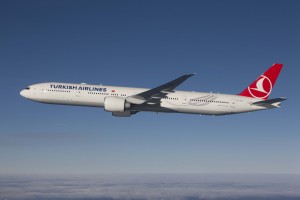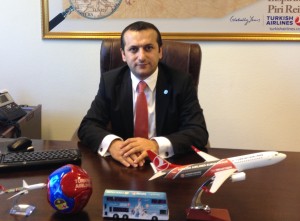Veysel Tas became the General Manager of the Beijing office in November 2010, following stints in Istanbul and Greece. He says he has “grown up” with Turkish Airlines, after taking his first job with them in 2004 following his graduation from university in Business Administration. After living here for two years he counts China as one of his favourite countries in the world. Carl Hayward caught up with him to discuss doing business in China and their ambitious plans for the future.
What are your general impressions of conducting business here?
Chinese people’s travelling and consumption habits are quite different from those in Europe. There, people tend to plan perhaps three to six months ahead of their vacation, and they usually buy tickets from airlines. Here, due to the visa restrictions or other issues, people seldom plan vacations ahead of time, and they tend to buy tickets from agents. Relationship building is a very important element of doing business here, and once you begin to understand the people it becomes easier to understand their needs and then to answer those needs. Also, the negotiations can often be very difficult, but the rewards outweigh the effort. It is not so difficult to work here provided you are prepared to take everything step by step.
What helps you to maintain a competitive advantage?
I think being voted Best Airline in Europe two years in a row helped. Last month we became number one in the world for most destinations covered by an airline—90 countries and 202 destinations in total. We have a geographical advantage too in that, being based close to Europe, Africa and the Middle East, we can cover more than 100 destinations within three hours, making us a natural transfer hub. For the flights from Beijing, Shanghai and Hong Kong, we offer our Comfort Class, which is between the economy- and business-class tiers. This class has been voted number one in the world for the last two years. Almost 70 other carriers offer something similar, so it is a very competitive area for airlines.
We work with Turkish DO&CO, to supply passengers with fresh, world cuisine. Skytrax awarded us Best Food in economy class in 2010, and Skyscanner awarded us The Best Onboard Food in 2011. We’re also one of the first airlines offering a Flying Chef service on long-haul flights, where business class passengers can choose their own menu. We also possess one of Europe’s youngest fleets with an average age of six years.
What are some of the main day-to-day challenges that you face?
I have to remind myself every day that to continue our rapid growth and development worldwide I have to improve myself in every field. Different culture, different clients and a different market also provide many challenges, but after being here for two years I feel more comfortable in this respect. Other carriers are always improving their services too, so it is not possible to just sit back.
So it’s not enough just to try and compete on price?
No, that is impossible. We really have to understand the market here, and how the people think. There are lots of carriers that do focus on lower prices, but we prefer to emphasise our quality.
 I understand that you are planning to add some new flights; can you tell us about those?
I understand that you are planning to add some new flights; can you tell us about those?
We are currently negotiating, so it is not a good time to announce our plans, but suffice to say we’re looking to increase the number of destinations and increase the frequency of our flights. It is difficult to be awarded a [new] slot, because the airways are already very congested. So we have made our applications, and will await their response.
How do you go about selecting your sponsorship partners, and do you have a specific strategy to help promote brand awareness in China?
Turkish Airlines aims to be the best airline in the world. FC Barcelona and Manchester United have demonstrated themselves to be two of the best football clubs in the world. By associating ourselves with champions, we hope to demonstrate our commitment to excellence. Building a global brand is one of our key strategic goals as a company. The global recognition and respect for these football clubs allows us to reach a great number of people worldwide with our positive brand message.
What are your plans going forward?
India and China will be our primary market focus, and our overall aim is to become the number one airline in the world. China is growing so quickly, and the majority of our investment is here. We are very ambitious, if we can become the number one airline in terms of service in Europe, it is not a huge leap to imagine that we can become number one in the world. We know what our challenges are and we’re motivated to the meet them head on.
Turkish Airlines opened its first route from Istanbul to Beijing in 1999, and has since added direct flights to Shanghai, Guangzhou and Hong Kong.



Recent Comments